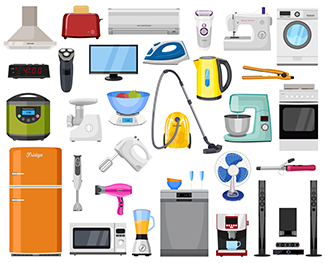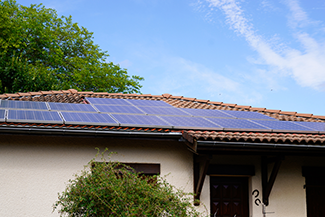Maximizing Solar to Power Small Electronics
Maximizing Solar to Power Small Electronics
When most of us think of household items that use a lot of energy, we generally think about the big boys -- the air conditioning unit, refrigerator, washer, dryer, or dishwasher.
 You may be surprised to learn that many small appliances use considerable amounts of energy, more than their larger counterparts.
You may be surprised to learn that many small appliances use considerable amounts of energy, more than their larger counterparts.
“The awareness of home electronics and the large amount of electricity they use is growing,” says Randy Cole, owner, Fox Valley Electric and Solar, a Rosie-Certified Partner.
Sucking It Up, Buttercup
According to Visual Capitalist, an online publisher of globally-focused topics including markets, technology, energy, and the global economy, these appliances use the most energy.
- Cooling and heating = 47%
- Water heater = 14%
- Washer and dryer = 13%
- Lighting = 12%
- Refrigerator = 4%
- Electric oven = 3-4%
- TV, DVD, cable box = 3%
- Dishwasher = 2%
- Computer = 1%
 Yet, these small items below surprisingly pack a big energy punch as measured in kilowatt-hour (kWh).
Yet, these small items below surprisingly pack a big energy punch as measured in kilowatt-hour (kWh).
- Portable Heater = 1,500 kWh -- Though portable heaters use less energy than central heating systems, they still consume quite a lot.
- Iron = 1,200 kWh -- Thank goodness the wrinkled-look look is in.
- Hair Dryer = 1,000 to 1,875 kWh -- If you have long or thick hair, you will save energy by air-drying those locks.
- Portable Humidifier = 1,000 kWh -- Humidifiers are a must in our dry climate, especially when the heater is on in the winter.
- Toaster Oven = 1,500 kWh – Those Bagel Bites costs more than you think.
- Coffee Maker = 600 - 1,200 kWh -- Can’t live without your morning cup of joe? Invest in an energy-efficient model.
- Vacuum = 300 - 1,000 kWh – You are sucking up more than just dirt and pet hair.
- Microwave = 600 to 1,500 kWh -- Nuking leftovers still costs money.
- Blender = 300 kWh -- Getting your day started with a smoothie and protein shake uses its fair share of power.
In addition to their usage, these appliances can draw vampire power, also known as phantom power, when not in use. Vampire or phantom power refers to the way electric power is still consumed by electronics and electrical appliances while they are switched off or in standby mode. This occurs when devices that appear to be turned off, are still receiving power at the plug. So, energy is still flowing from the grid and that adds up over time on your energy bill. So, turn off and unplug electronics and small appliances when not in use.
Save With Solar
 Why waste valuable energy and your hard-earned money by solely relying on one system to power your home and electronics? Arizona receives the highest amount of solar irradiation in the United States. You may as well power those appliances with solar.
Why waste valuable energy and your hard-earned money by solely relying on one system to power your home and electronics? Arizona receives the highest amount of solar irradiation in the United States. You may as well power those appliances with solar.
“A home solar system can and will provide clean, renewable energy to power appliances and electronics while saving you thousands of dollars in the long run,” says Randy.
According to the U.S. Department of Energy, a solar system installed in Arizona will produce 60 to 70 percent more electricity than a rooftop system in most other places in America.
Like a home renovation, solar panels are viewed as upgrades and will likely increase your home’s value. Studies show that homeowners pay a premium for a solar home. One study by Lawrence Berkeley National Laboratory showed that on average, solar increased the value of a home by about $15,000. Although market factors like electricity rates and system size need to be taken into consideration.
Solar energy is sustainable, renewable, and plentiful. Each kilowatt-hour (kWh) of solar that is generated will substantially reduce greenhouse gas emissions like CO2, as well as sulfur oxides, nitrogen oxides, and particulate matter. Solar also reduces water consumption and withdrawal.
The cost of using solar to produce electricity goes down each year, plus there are tax incentives and rebates. Over time, you will see lower monthly utility bills. So why not make the switch?
Home Maintenance To-Do | #PoweringHomeElectronics
###
Podcast
Discussion of cabinet lighting, solar to power home electronics, mistakes during home inspections. Plus, Joanna Lawson and Sefora Onye continue with their story of leaving tyrannical regimes in their home country to make it to America and their takeaways about what it means to be an American! (Find their full story here)
Sponsored By: Fox Valley Electric
 Since 2007, Fox Valley Electric has provided quality electrical construction, service and maintenance to their customers in the Phoenix metropolitan area. Their electricians can install anything from new security lighting to a whole-home generator that will keep appliances working during a power outage.
Since 2007, Fox Valley Electric has provided quality electrical construction, service and maintenance to their customers in the Phoenix metropolitan area. Their electricians can install anything from new security lighting to a whole-home generator that will keep appliances working during a power outage.
Photo Credits:
- Shutterstock
RELATED CONTENT:
- Blog: Home Energy Trifecta | Solar, Battery, and Generator
- Blog: Can My Home Benefit From A Backup Generator?
- Blog: Throw New Light on Your Life
- DIY FAQ: How Do I Choose A Backup Generator?
- DIY FAQ: Four DIY Projects That Help Pay For Themselves
- DIY FAQ: Can I Add Security Lighting Without Raising My Energy Bill?
- DIY FAQ: How Can I Get More Natural Light in My Home?
- Podcast: What You Need to Know to Buy a Light Bulb
